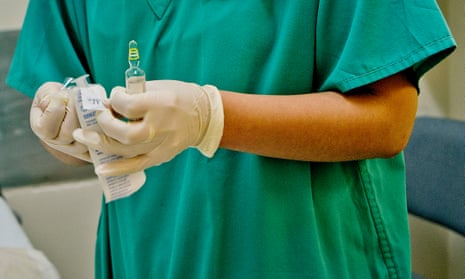Hundreds of young and vulnerable women seeking abortions are to be sent to other clinics after some services run by Marie Stopes International were suspended because of inspectors’ safety concerns.
The intervention by the Care Quality Commission (CQC) means about 250 women a week are to be sent elsewhere to have their pregnancies terminated until Marie Stopes International can assure the inspectorate that it is proceeding safely.
Although surprised by the timing of the inspection and announcement, Marie Stopes International said it had agreed “to make sure that patients are protected from potential harm when undergoing pregnancy terminations”.
The women affected are those under the age of 18 and those who are more than 12 weeks pregnant, which means they cannot take the abortion pills but must have surgery to complete a termination.
The British Pregnancy Advisory Service charity (BPAS) said it was working round the clock to provide the services instead. “It will be difficult but we will find a way to do it,” said Abigail Fitzgibbon, head of advocacy and campaigns.
“It is a significant undertaking. The challenge is also because some of these women will be presenting for late abortions. Some are travelling from Ireland [where abortion is illegal unless the woman’s life is at risk] and some are foetal anomaly cases.”
The longer the pregnancy has gone on, the more distressing the abortion is for a woman and those trying to help her, she said.
The CQC did not provide full details as to why it had demanded the suspension but said it was concerned that the right protocols may not be in place to ensure that girls under the age of 18 were able to give informed consent to a termination.
The inspectors were also concerned about the standards of anaesthesia in clinics when women were undergoing surgical abortion after 12 weeks of pregnancy, which is a small minority of total terminations. The CQC said there was a “lack of assurance in relation to training and competence in conscious sedation and general anaesthesia”.
Marie Stopes International had suspended terminations for all under-18s and vulnerable groups of women, the CQC said. It had also suspended any terminations carried out under general anaesthetic or sedation after 12 weeks. The CQC added that surgical terminations had been suspended at one specific Marie Stopes clinic, in Norwich.
Prof Edward Baker, the deputy chief inspector of hospitals at the CQC, said: “Given the nature of the concerns we identified on our inspections, it is right that Marie Stopes International has suspended a number of its services.
“At all times, our priority is to ensure that patients get safe, high-quality and compassionate care. We believe that the action taken is appropriate to address our concerns. We will continue to monitor these services very closely and we will not hesitate to take further action, if needed.
“We will report fully and publicly on our inspection findings as soon as our regulatory process has concluded and we are able to do so.”
The CQC became concerned during routine inspections of clinics, it said. As a result, it carried out an unannounced inspection of Marie Stopes International’s corporate headquarters in England last month and of its call centre last Friday. In its statement, it said it had “raised concerns about the provider’s corporate and clinical governance arrangements and patient safety protocols in specific areas”.
The services would not restart until Marie Stopes International had satisfied the inspectorate that it had made the necessary changes to ensure all women were safe, the CQC said.
A spokesman for Marie Stopes International said the organisation was slightly surprised by the timing and tone of the announcement. This was about governance and protocols and there was nothing that endangered the safety of its clients, he said.
In a statement, the chief executive, Simon Cooke, said: “As of today Marie Stopes UK has agreed with the Care Quality Commission to voluntarily suspend some of its termination of pregnancy services. This is to allow Marie Stopes UK to resolve areas of concern in its training and governance procedures. We are working urgently with the CQC on these areas and intend to regain full assurance within a few days.
“Alongside this, our immediate priority is to make sure that women booked into one of our affected services are rebooked swiftly into alternative local services and we are working closely with NHS England to ensure that this happens.
“We’d like to reassure people that our other services remain unaffected. Each year 70,000 women are treated within our centres, and our clinical outcomes continue to outperform the national average.”
NHS England has set up a confidential helpline on 0300 123 1041 (9am to 5pm at weekends and 9am to 8pm weekdays).
“This will be an anxious time for those women affected and we are taking immediate action to ensure everybody involved has access to the appropriate confidential advice and services,” said Prof Sir Bruce Keogh, NHS England’s national medical director.
While all agree that any shortcomings in the services must be identified by the CQC and addressed, abortion providers and campaigners will fear that the inspectorate’s action and closure of services could undermine the pro-choice cause.
Fitzgibbon of BPAS said: “We worry that there is an enormous drive to demonise abortion providers in general.”
Abortion clinics have always come under severe scrutiny. When Andrew Lansley was health secretary, there was a crackdown on clinics to ensure that all their paperwork was correctly signed, after it emerged that some clinics had pre-signed forms so that effectively only one doctor was giving approval in an individual case, instead of the required two. Lansley suggested clinics were effectively defying parliament and granting abortions on demand.
